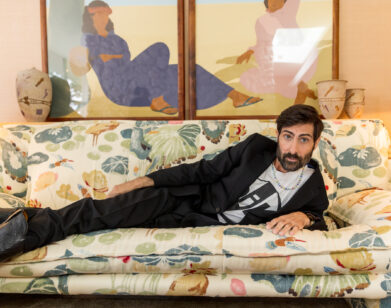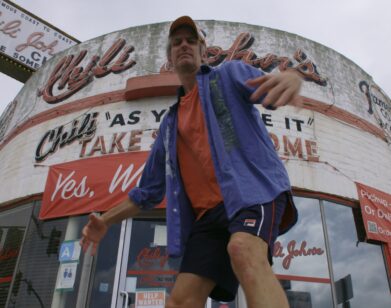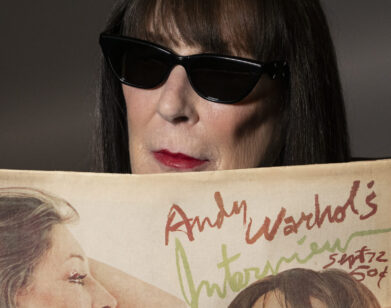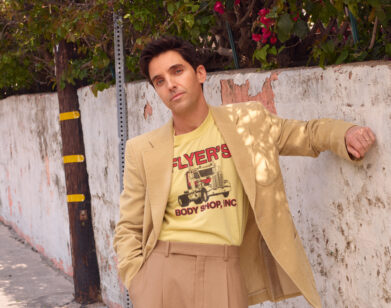Lynn Shelton, Once on This Island
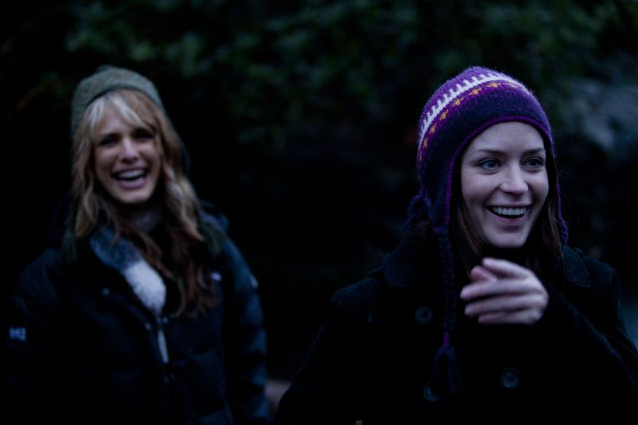
ABOVE: LYNN SHELTON (LEFT) WITH EMILY BLUNT ON THE SET OF YOUR SISTER’S SISTER. IMAGE COURTESY OF IFC FILMS
Writer/director Lynn Shelton’s film Your Sister’s Sister is a small film, in almost every sense of the word. It focuses on just three characters—Iris (Emily Blunt), her older sister Hannah (Rosemarie DeWitt), and Iris’s best friend Jack (Mark Duplass); most of the action takes place in a single cabin on an island in the Pacific Northwest; and the narrative stakes are all of the personal, domestic kind. A year after the death of his brother, Jack’s in a rut, and Iris invites him to go to her family’s summerhouse for a little soul-searching—not knowing that Hannah, having just broken up with her longtime girlfriend, is already there and is all too willing to share her tequila. When Iris shows up the next day, Hannah and Jack decide their drunken encounter is better left unmentioned; but over the course of a few days on the island, secrets get harder to keep.
For all this, though, Your Sister’s Sister is surprisingly expansive—its narrative dilates, bit by bit, to incorporate years’ worth of history between these characters. The onscreen chemistry between Blunt, DeWitt, and Duplass never misses; their every interaction is perfectly, naturally human. Shelton has been favorably compared to John Cassavetes (she also won the award that bears his name at Sundance for her 2009 feature Humpday), and her naturalistic shooting style bears the association well. But it doesn’t do justice to her empathy: she very obviously deeply cares about the characters she creates, with all their faults and foibles, and she makes it near-impossible for her audiences not to do the same.
ALEXANDRIA SYMONDS: I was wondering if you saw an article on Gawker yesterday that posited that you would be the next woman to win an Oscar for directing.
LYNN SHELTON: Everyone’s talking about that article! It’s crazy, I don’t know why it’s all over the place, but, yes, I did happen to see that article.
SYMONDS: How do you react to that?
SHELTON: I react by blushing heavily! No pressure, dude, you know.
SYMONDS: I agree with it! So, Your Sister’s Sister. It seems to me that impulse versus deliberation is a pretty big theme in the film. Hannah does so much on impulse, whereas Iris spends a lot of the film thinking things through—almost too much. Did you think about these characters in those terms?
SHELTON: I don’t know if we actually put it like that. It’s so obvious when you say it now, which the case for a lot of themes in my films—I know that I’m working with certain dramatic material, but I can’t really see exactly what those themes are until I parse it all out later. Or until someone, such as yourself, does it for me.
When I initially imagined them, a lack of impulse control was definitely something that I wanted for Hannah, and especially in her particular state. It’s also one of the reasons why the movie takes place on an island: it’s isolated physically from the rest of civilization, or your normal, humdrum everyday life. It creates a new freedom for you mentally, I think, or emotionally: you would do things you would not normally do or say. There’s a freeing up that happens in those circumstances.
SYMONDS: The film is so naturalistic. How much were you all able to discover these relationships before you started filming?
SHELTON: [DeWitt, Duplass, and Blunt] are all credited as creative consultants in the film, because they were asked above and beyond what they are normally asked to do as actors in a film. In this case, for eight or nine months, every few weeks we would be having these conversations on the phone, spitballing about backstory, the history of the characters’ lives, the relationship history. By the time we get to the set, we had backstory up the wazoo.
I really wanted these characters to feel like a second skin. I want actors to be able to slip into these characters like a hand into a glove. I want it to be second nature, and when they open their mouth, it’s just going to be perfect, because they have such a story foundation of who they are and what they mean to each other. If they’re able to find the overlap between themselves as people and these characters, then that’s going to be so much easier than me saying, “This is who you are.”
The other thing is that in the collaborative process, you create a real intimacy; everybody ends up sharing personal stories and personal observations and their philosophies, their psychological side. By the time you get to set, it just creates such a sense of trust and intimacy between the director and the actors. It’s really, really great. And it invests them. It really becomes our project. It’s not just my project and they’re working to project my vision. It becomes this really joint vision, and everybody’s on the same page and feels equally invested. Our special challenge, in this case, was that we lost our first Hannah three days before shooting.
SYMONDS: Oh, my gosh.
SHELTON: It was insane. Luckily, half of it was in all of our heads, and half of it was on the page, but I was able to sit down and finish on paper this bible of character backstory and explanatory exposition about what was going on psychologically between everybody, and I was able to hand that to Rosemarie when she came in with no time at all. Still, we want her to bring her stamp to it. Luckily, we were all staying in the same place, a stone’s throw away from the picture house. So we’re all living together, and having wonderful food together, so she and Emily were able to stay up late at night and bond as fast as they could. They had such an openhearted approach to that. It’s kind of incredible what they were able to accomplish in creating that chemistry.
SYMONDS: Rosemarie and Emily really do look like sisters, but obviously you didn’t ask Emily to adopt an American accent, and about halfway through the film, it’s explained that they’re half-sisters. Was it by design that the audience is should be in suspense about that?
SHELTON: The original actress that Rose replaced was also English. Basically, the reason why I didn’t want Emily to change her accent was because I didn’t want her to be improvising in a different accent. Again, I wanted it as naturalistic and easy as possible, so I figured that would be counter to that goal. Then as we were developing the characters and the backstory, I really liked the idea of them being half-sisters—because what it entailed is right from the beginning of their relationship, there’s a point of friction. The idea is the pregnancy of Emily’s character, Iris, is what takes away the father from Hannah. Her father is stolen away by this child, and that’s a starting point for a relationship between sisters.
I think the audience’s ears are pricked up waiting to hear the explanation, why there are these different accents. And then when they hear it, they’re really listening. They’re like, “Oh, I see, they just share the same dad, and they only spent summers together, and there’s this age difference,” and you kind of get a whole bunch of little nuggets. I like how it creates a little question mark, but then it gets solved. And I like it when [the explanation] shows up, almost after people have forgotten about it.
SYMONDS: The cabin itself is such a beautiful setting. How did you find the island in the first place? I’m not from the Pacific Northwest—is it well known there?
SHELTON: Yeah, there’s a bunch of islands in this little group called the San Juan Islands, and they’re totally gorgeous. Someone was asking me about the bicycling—that’s sort of a tradition, the thing you do, is to bicycle up to these islands. Not everybody, some people use cars, they’re more sane. But they’re very bicycle-friendly once you get there, but most of the trip is a long way, but it’s on the ferry. So as long as you can get yourself to the ferry in Seattle, you can have this lovely time bicycling on the island, so that was kind of why it’s not an odd thing to suggest. [laughs] In terms of which island, it’s a big secret, because it’s part of the stipulation that the owners had when they gave us permission to use the place was they didn’t want anyone to know exactly where it was. But all of those islands are very beautiful. I spent many summers of my childhood in rentals with my family, and I think many people who grew up in the Pacific Northwest have had that experience. My friend who appears as the waitress in the movie, Kate Bailey, is an associate producer, and she was the initial liaison to these families. Her family is one of the co-owners of this place. It took months of begging and pleading, wooing, and assuring, because we do have a very light footprint, and we were assuring them that it wasn’t going to be a Michael Bay production or something. Very gentle.
SYMONDS: We don’t meet Hannah’s ex-girlfriend or Jack’s brother, but those two missing characters haunt this story, or provide a framework for it: they provide the background for Iris’s and Jack’s relationship, and why Hannah is at the cabin in the first place. When you were working on the story, did you get to know these missing characters as well as the present ones?
SHELTON: We definitely, definitely knew who they were and what all those relationships looked like. What Iris and Tom’s relationship had looked like, what Tom and Jack’s relationship had looked like, and the same with Pam and Hannah—how long they’d been together and how it happened and what their lives were like—all of that stuff was mapped out. Absolutely. There’s so much backstory that the audience has absolutely no knowledge of, because in real life you don’t open your mouth and say, “Do you remember that time blah blah blah,” or, “As you know, my ex-girlfriend blah blah blah.” People don’t do that in real life. It always rings false to me, unless it’s cast in a very viable way. Like when they exposit about their father and his history, they’re filling in Jack; that feels okay to me. It’s just there for the actors to create characters who really feel like there’s a general rapport here—these people know how to push each other’s buttons or whatever. You can feel that history behind that and underneath that, and you don’t need to know the details as an audience member.
YOUR SISTER’S SISTER IS OUT NOW.

